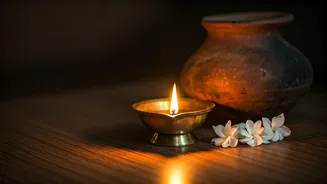Recognize Your Thoughts
The first step in dealing with anxiety involves becoming aware of the thoughts that fuel it. Anxiety often thrives on negative or distorted thinking patterns.
Recognizing these patterns allows you to challenge them directly. Start by simply observing your thoughts, without judgment. Notice the types of thoughts that occur when you're feeling anxious—are they catastrophic, focusing on worst-case scenarios? Are they self-critical, highlighting perceived flaws? Once you've identified these patterns, you can begin to question their validity. Ask yourself if there's evidence to support them, or if they're based on assumptions. By actively recognizing and questioning your thoughts, you create a space between the thought and your reaction, which is a crucial step towards reducing anxiety's impact. This awareness is the foundation for employing other coping strategies because it equips you with the tools to respond to anxious thoughts more thoughtfully, rather than automatically reacting to them.
Breathe, Don't Fight
Anxiety often manifests physically, leading to rapid breathing and heightened heart rate. One immediate way to combat these physical symptoms is through deep, conscious breathing. Try a simple technique: Inhale deeply through your nose, hold the breath for a few seconds, and then exhale slowly through your mouth. This practice helps to activate the parasympathetic nervous system, which promotes relaxation. Focus on the physical sensation of your breath; feel your chest and abdomen expand and contract. This simple act of focusing on your breath can serve as a mental anchor, distracting you from anxious thoughts and grounding you in the present moment. Regular breathing exercises can lower stress hormone levels over time. When experiencing anxious feelings, resist the urge to fight them. Allow yourself to experience the feelings without judgment or resistance. Fighting them often makes them worse. Acknowledge your feelings and use breathing to help yourself find ease.
Listen to Your Body
Our bodies often give us clues about our stress levels before our minds do. Becoming attuned to these physical signals can help you catch anxiety early. Start by regularly checking in with your body. Notice any areas of tension – shoulders, neck, or jaw. Are you clenching your fists or tensing your muscles? When you notice tension, pause and consciously try to relax those areas. Gentle stretching or progressive muscle relaxation can be helpful. This involves tensing and releasing various muscle groups to become more aware of physical sensations. Regular exercise and mindful movement, such as yoga or Tai Chi, can also help maintain this mind-body connection. They not only promote physical health but also teach you how to be present in your body and aware of physical feelings. Over time, this heightened body awareness becomes a natural way to identify and respond to anxiety before it escalates.
Challenge Your Thoughts
Once you're more aware of your thought patterns, the next step is to challenge them. This involves questioning the validity of your anxious thoughts. Ask yourself: Is this thought based on facts or assumptions? What’s the worst that could happen, and how likely is it? Are you catastrophizing, imagining the worst-case scenario? Replace negative thoughts with more balanced and realistic ones. If you are worried about a social situation, challenge your assumptions about what others are thinking or how they might judge you. Consider alternatives. It might be helpful to keep a journal where you write down your anxious thoughts and then write down the evidence for and against each one. This helps you to see the bias in your thinking. By actively questioning and restructuring your thoughts, you can weaken the hold of anxiety and create a more positive mindset.
Embrace Gentle Actions
Take simple, manageable steps to relieve your anxiety. Break large tasks into smaller, more achievable steps. This approach prevents you from feeling overwhelmed and builds a sense of accomplishment. Incorporate activities that bring you joy. This could be anything from reading a book, listening to music, or spending time in nature. Make time for hobbies you enjoy and engage in activities that make you feel relaxed. Also, maintaining a regular routine is important. A predictable schedule can give you a sense of control and stability. Eat regular meals, go to bed at a consistent time, and set aside time for leisure activities. Regular exercise and getting adequate sleep are important for mental health. By consistently taking small, positive actions, you build resilience and reduce the impact of anxiety. Each small victory reinforces your ability to cope, gradually increasing your confidence.














